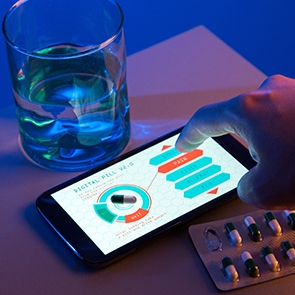Digital Health is one of the hottest terms of this decade. This should come as no surprise when you combine the increasing power and affordability of computing and communication technology on one hand, and the rising expectations of and pressures on health systems on the other. The healthcare industry has consistently underinvested in the appropriate use of information technology and it lags behind comparable knowledge-intensive industries by about 15 years. Digital Health could well be the next big growth area for many companies.
Global technology giants have signaled a strong interest in the health sector, with companies like IBM and Google in particular making bets measured in the billions. But consider this for a moment: is this just hype created by the tech companies to stimulate their client industries, particularly life sciences and healthcare, to buy their branded picks and shovels for the 21st century gold rush of big data mining? Like many disruptive technological changes of recent times, I feel we might be overestimating the short-term benefits and underestimating the long-term ones.
What exactly is Digital Health?
It is difficult to find a concise definition of Digital Health. Its scope is very wide. I think the Wikipedia definition comes closest to embracing its complexity. I’d like to bravely/foolishly simplify it. Digital Health refers to the information and processes, and technologies and systems, that enable a person to make informed choices about their own health, take action to improve it, and monitor their progress to realize what works for them and what doesn’t. By contributing their own biological and behavioral data to the health system, people can give permission to carefully selected organizations and people in the system to anticipate and respond to their health and care needs, help good things happen and, where possible, prevent bad things from happening.
Why is it important now?
We are seeing the last of the ‘accidentally well’ people, the pre-war generation that didn’t have to do anything in particular to stay healthy. Today, there are many more people whose ill health can be attributed to rapid changes in lifestyle in our modern society. We have easier access to energy (food) and less opportunity to expend it. Staying healthy now requires some effort that is not directly related to that involved in working or acquiring our food. We need to make conscious choices about food, work, play and rest in order to stay healthy.
The burden of lifestyle-related illness consumes around 70% of healthcare budgets in western economies, and the absolute value of these budgets is set to rise rapidly because of the ageing population in many of these countries. With healthcare budgets at breaking point already, clearly there is a need for a different way. The promise of Digital Health to enable better self-care and prevent or postpone the development of serious disease seems to offer a way out of a difficult situation.
What are the exciting developments?
IBM and Memorial Sloan Kettering (MSK) have collaborated to create IBM Watson for Oncology. IBM Watson is an artificial intelligence (AI) appliance that is available to large and small companies as a service. Just as IBM trained Watson to win the game show Jeopardy by feeding it all the prior questions and answers so it could learn how to answer future questions, MSK trained Watson using all the data they had available on cancer diagnoses and treatments provided to their patients, and the outcomes experienced. As a result of over two years of training Watson, oncologists around the world now have access to the best oncology brain in the world in the palm of their hand. The service continues to improve with all the data and outcomes it is still gathering.
The creation of AI infrastructures like Watson is spawning a new ecosystem of startups in Digital Health. Consider Talkspace, which provides psychological therapy through instant messaging. Although right now most of the therapy is being provided by a network of human therapists, all the interactions and outcomes are being ingested by Watson. The goal is to create an AI chat bot that will consistently provide high-quality psychological therapy. Babylon Health is attempting something similar in general practice (primary care or family medicine). These are ambitious goals. If they are successful, these ventures will dramatically change how healthcare is delivered in their markets.
There are scores of new ideas and businesses that are emerging every day, and Twitter is a useful tool for keeping up with new developments. Following people like @EricTopol (eminent cardiologist and author of The Creative Destruction of Medicine), @ManeeshJuneja, @Paul_Sonnier, @vgul, and others like them, will help you scan the Digital Health horizon.
What are the challenges?
There isn’t a clear regulatory framework for Digital Health. In the UK, the Care Quality Commission (CQC) and the Medicines and Healthcare Products Regulatory Agency (MHRA) are working hard alongside industry to bring the regulatory framework closer to the emergent technology frontier. There is a clear recognition of the potential of Digital Health to transform public (and private) health and care services. The regulator is keen to see that services are improved and people aren’t exposed to any new harm as a consequence of these innovations. The General Data Protection Regulation (GDPR) is also being updated with clearer guidance for all digital technologies, and particularly for healthcare, where personal and sensitive data is frequently processed.
One of the key challenges in most markets is finding a suitable business model for these great new innovations. Healthcare has a peculiar problem. In other industries, we see that technological innovation increases choices and tends to drive performance up and prices down. In healthcare, innovations increase choice and demand, but generally tend to increase prices. Consequently, healthcare budgets have been rising faster than inflation around the world. Secondly, most healthcare payment or reimbursement tends to be based on activity rather than outcomes (results). So there is usually no incentive to focus on prevention, and it is frequently not in the interest of most people and organizations in the healthcare business anyway. This is a toxic problem for healthcare for which strategic solutions need to be found.
What questions should we be asking our clients?
There is no doubt that healthcare needs to change in order to remain sustainable. An industry cannot remain viable if its customers cannot afford its services. Unless we see dramatic change in the next 10 years, there could be quite shocking economic and social consequences for the entire healthcare ecosystem (which includes life science and medical technology), and for society as a whole. If your clients are in any of these sectors, they are likely to be alive to these seemingly intractable issues. However, it may be worth your while to probe. Has your client considered how their businesses might get disrupted by digital technology? Where do they see the disruption coming from? What are they doing to mitigate the potential damage, quell it, or embrace it? Finally, how are they engaging with customers, regulators and innovators to ensure that their business will have a meaningful role to play in the emergent digital future?
Comments and questions are welcome via Twitter: @4LoyLobo and #ac-digihealth.





